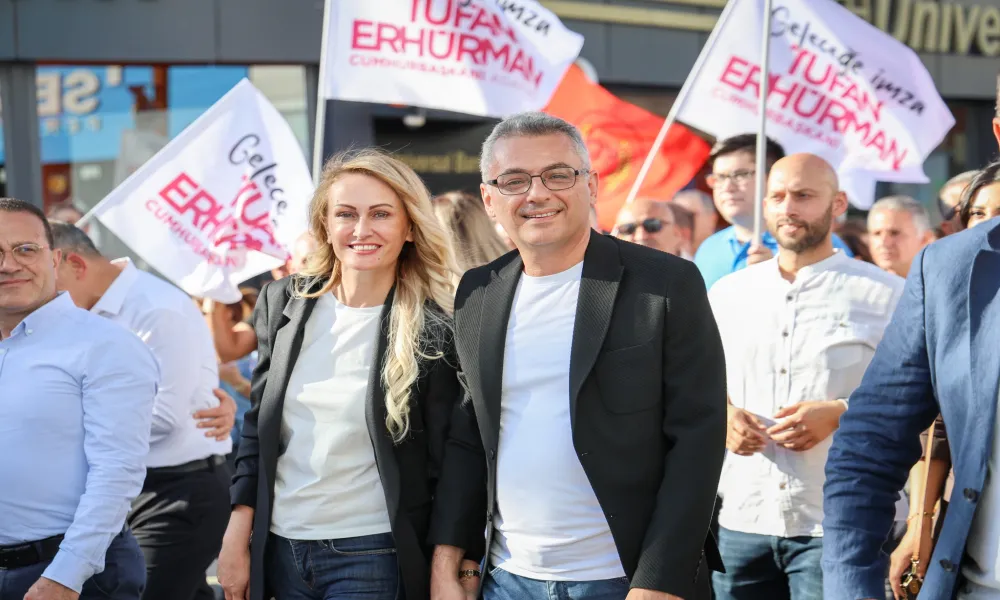Work on the Cyprus problem began since Saturday, newly elected Turkish Cypriot leader Tufan Erhürman said in an interview on Monday, where he emphasised the need for new and more effective confidence-building measures (CBMs) beyond those discussed at the recent informal 5+1 meetings.
Speaking on the Turkish Cypriot broadcaster Bayrak, Erhürman said that while opening new crossing points and easing congestion at existing ones would be a positive step, it would not be sufficient on its own. He stressed the need for broader measures to build genuine trust between the two communities.
Erhürman confirmed that the recent informal meetings did not include negotiations for a comprehensive settlement. He reiterated that any formal talks would be coordinated with Turkey, noting that consultations with Ankara would take place “very soon”.
According to Erhürman, CBMs should not necessarily be discussed at the level of 5+1 meetings. “We also have Nicosia,” he said, arguing that certain matters, such as the operation of crossing points, could and should be handled locally rather than in New York or Geneva. He called for the process to be restructured through consultations with the United Nations, the European Union, and, importantly, President Nikos Christodoulides. Even if 5+1 meetings occur every few months, he said, “regular and ongoing work must take place in Nicosia.”
Talks aimed at a concrete solution
Erhürman underlined that improving the operation of crossing points directly affects daily life on both sides and can produce “win-win outcomes”. He proposed the creation of a permanent consultation mechanism, involving both the leaders and their negotiators, to ensure continuity in communication and progress.
He also confirmed plans to make his first official visit to Ankara later this week or early next week. As for his first meeting with Christodoulides, Erhürman said that while it need not be merely social, he remained open to all forms of dialogue and diplomacy.
Responding to criticism that his party, the Republican Turkish Party (CTP), had set preconditions on the Cyprus problem, Erhürman said this was a misunderstanding. The four points raised by the CTP, he explained, are consistent with existing United Nations Security Council resolutions. “For example, I don’t understand why political equality is seen as a precondition,” he said. “It is part of the UN parameters, just like bi-zonality and bi-communality. These are fundamental principles, not bargaining chips.”
He dismissed media-based debates as unproductive, stating that substantive discussions should take place directly between himself, President Christodoulides, and the UN. Erhürman stressed that the Turkish Cypriot community does not want “open-ended talks” or negotiations “for the sake of negotiations,” but rather talks that lead to a concrete solution.
Current situation erodes trust
He cautioned against restarting talks from scratch, saying that revisiting issues already agreed upon would only waste time. Instead, he called for well-structured pre-negotiations to ensure clarity and higher chances of success once formal talks begin.
Erhürman also referred to the recent European Parliament resolution on missing persons, saying that mere condemnation was insufficient. The diplomatic gap must be bridged, he said, adding that he would brief all political groups in the European Parliament, beginning with its President.
On the property issue, Erhürman reminded that the evaluation of the Immovable Property Commission will take place in Strasbourg in early December. The outcome, he said, must be analysed promptly and shared with the international community. “If we are to build trust, we must also explain to the UN and our interlocutors that the current situation does not build trust, it erodes it,” he noted.
Results-oriented approach
While supportive of CBMs, Erhürman underlined that they cannot replace a comprehensive settlement. “My approach is results-oriented,” he said. “I want to see effective actions. Four or five concrete steps within this five-year period. Ideally, I would like to resolve everything, but if that’s not possible, we cannot simply say that nothing will happen.”
He confirmed that he would soon meet with the committee already working on property issues, stressing that while there is much work ahead, “we have the energy to do it.” He pledged to collaborate with anyone willing to work towards progress.
Erhürman reiterated his commitment to the principles he outlined during his campaign, promising to serve as an “impartial president” representing all citizens, as required by the constitution. He rejected the notion that the Turkish Cypriot electorate voted solely on the Cyprus issue, saying that the society was not as divided as some suggest. “We chose to focus on substance rather than terminology,” he explained. “When the question was whether we should defend our sovereign rights, no one said otherwise. My concern is to move forward based on substance not on labels.”
